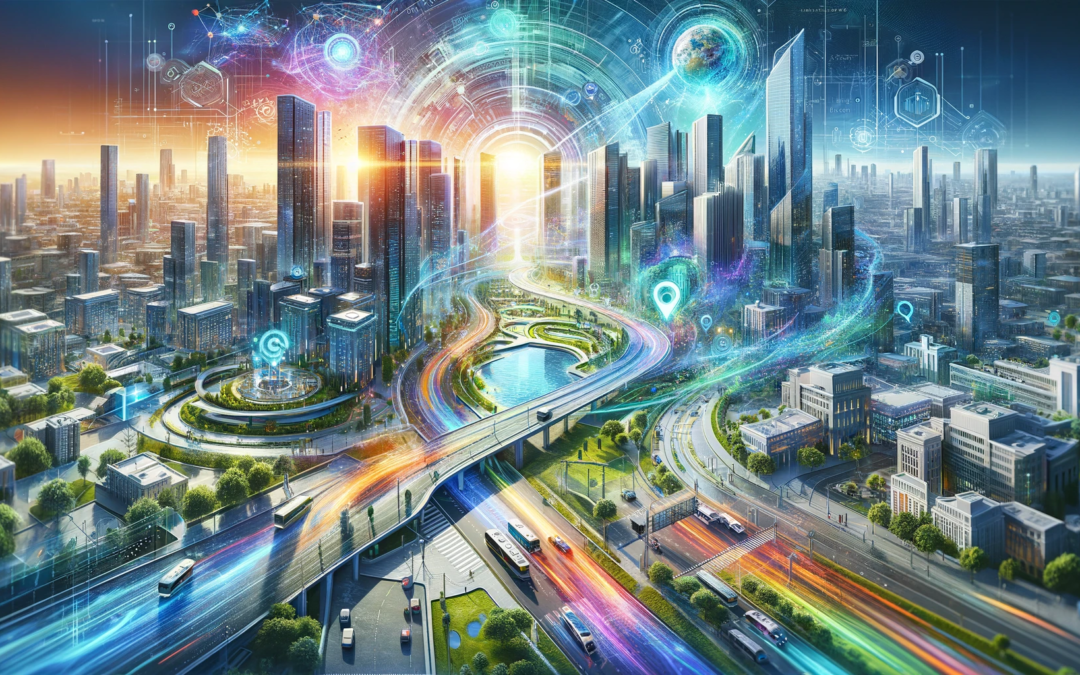As cities around the world grapple with the challenges of urbanization, the integration of Artificial Intelligence (AI) is emerging as a key solution for developing smarter, more efficient urban environments. By harnessing the power of AI technologies, cities can optimize their operations, address pressing urban challenges, and pave the way for a sustainable future.
The Power of AI in Traffic and Transportation Management
Traffic congestion is a major issue in cities, leading to wasted time, increased pollution, and frustrated commuters. However, with AI, cities can revolutionize traffic and transportation management. AI algorithms can analyze real-time traffic data, optimize traffic signal timing, and even predict traffic patterns to reduce congestion and improve the flow of vehicles. Cities like Singapore and Barcelona have already implemented AI-driven traffic management systems, resulting in significant reductions in travel time and improved road safety.
Enhancing Energy Management and Promoting Sustainability
Energy efficiency and sustainability are critical factors in the development of smart cities. AI plays a pivotal role in managing energy resources and promoting sustainable practices. By leveraging AI algorithms, cities can optimize energy consumption, manage utility services, and integrate renewable energy sources. For example, AI-powered smart grids can analyze energy usage patterns and adjust supply accordingly, leading to significant energy savings. Additionally, AI can support sustainability initiatives by identifying areas for improvement and suggesting strategies for reducing carbon emissions.
Transforming Urban Infrastructure and Maintenance
AI tools are revolutionizing the way cities plan and maintain their infrastructure. With AI-driven predictive maintenance, cities can proactively identify potential faults and schedule maintenance activities, reducing the risk of infrastructure failures. Furthermore, AI algorithms can analyze vast amounts of data to optimize urban infrastructure planning, ensuring that cities are designed for maximum efficiency and resilience. By integrating AI into urban infrastructure management, cities can enhance the quality of life for their residents and improve the overall urban experience.
AI-Driven Urban Planning and Design
Urban planners are increasingly relying on AI to design smarter cities. By analyzing data from various sources, including demographics, transportation patterns, and environmental factors, AI algorithms can provide valuable insights for urban planning. AI-powered simulations enable planners to visualize the impact of different design choices, helping them create more livable and efficient urban environments. From optimizing building placement to designing pedestrian-friendly spaces, AI is revolutionizing the way cities are planned and developed.
Challenges and Ethical Considerations
While the potential of AI in urban development is immense, it is essential to address the challenges and ethical considerations associated with its implementation. Data privacy and security are paramount, as AI relies on vast amounts of data to make informed decisions. Additionally, there is a risk of technological dependency, where cities become overly reliant on AI systems. It is crucial to ensure responsible and transparent use of AI, with a focus on human-centric urban development that prioritizes the well-being of residents.
The Future of AI in Urban Development
The integration of AI in urban planning and development is still in its early stages, and the future holds even greater possibilities. Advancements in AI technology, such as machine learning and natural language processing, have the potential to further transform urban environments. As AI continues to evolve, cities can expect improved efficiency, enhanced sustainability, and more personalized urban experiences. However, questions about the long-term implications of AI in urban environments remain, and it is crucial to navigate these advancements with careful consideration.
Engaging with the Audience
We would love to hear from you! Have you experienced the benefits of AI-driven urban planning or encountered smart city technologies in your city? Join the conversation and share your thoughts and experiences. Let’s discuss the potential benefits and challenges of integrating AI into urban development and shape the future of our cities together.
Conclusion
AI is revolutionizing urban planning and development, paving the way for smarter, more sustainable cities. From optimizing traffic flow and managing energy resources to enhancing urban infrastructure and designing livable spaces, AI is transforming the way cities operate and improving the quality of life for their residents. As we embrace the potential of AI, it is vital to strike a balance between technological innovation and ethical, human-centric urban development. By harnessing the power of AI responsibly, we can create cities that are not only efficient but also inclusive, resilient, and sustainable.
AI-driven traffic management systems optimize traffic flow and reduce congestion.
AI-powered energy management systems promote energy efficiency and sustainability.
AI-driven urban planning enables the design of more efficient and livable cities.










